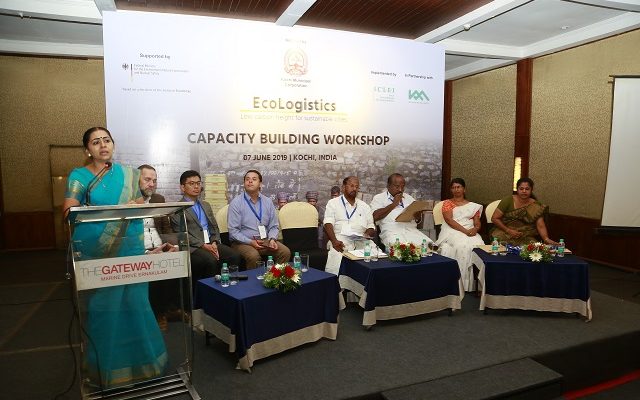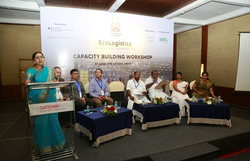Capacity Building Workshop Weighs Sustainable Urban Freight Management

ICLEI South Asia held a two-day capacity building workshop on sustainable urban freight management in Kochi on 7th and 8th June 2019.
The Kochi Municipal Corporation was the co-host, while the Kochi Metro Rail Limited was the technical partner of the event, which was organised as part of the “EcoLogistics — Low Carbon Freight for Sustainable Cities” project.
More than 175 stakeholders such as government officials and representatives of central and state government agencies, private stakeholders, freight lorry associations and trade, industry and research organisations, attended the workshop.
National and international freight experts presented sector-specific learnings and strategies, as well as good practices from developed and developing countries at the workshop. Besides technical presentations, there was brainstorming on sustainable urban freight management strategies in Kochi and on the way forward under the EcoLogistics project.
Ashish Rao Ghorpade, Deputy Director, ICLEI SA, explained the focus of the capacity-building workshop to the participants, saying that the project was the first-of-its-kind global initiative. It aims to prioritise strategies that promote goods transportation with minimal impacts on air quality, noise, health and fatalities and injuries, besides reducing traffic congestion and GHG emissions.
Mr. Ghorpade said the project was being implemented in Kochi, Shimla and Panaji. ICLEI SA is assisting these cities in developing Low Carbon Action Plans for Urban Freight, supporting the implementation of demonstration projects, and in suggesting national policy recommendations for the urban freight sector.

The project is being supported by the German Federal Ministry for the Environment, Nature Conservation, and Nuclear Safety (BMU) through the International Climate Initiative (IKI) programme.
Smt. Soumini Jain, Mayor, Kochi, in her welcome speech emphasised the importance of freight management and its role in the sustainable development of Kochi city. She said Kochi needed a better, more organised freight transportation system in view of its urban growth. She stressed on the importance of the EcoLogistics project as the city needed a roadmap to aggressively promote the use of non-motorised transport, and improve the last-mile connectivity for goods transport.
There were technical presentations on sustainable urban freight management on day one of the workshop. These were made by Tsu-Jul Cheng, Program Manager, Ecomobility, ICLEI; Dr. Gitakrishnan Ramadurai, Associate Professor, IIT Madras; K.V. Mahidhar, Executive Director, CII Institute of Logistics, Delhi; Ian Wainwright, Director, Future City Logistics, London; Camilo Urbano, Head, Urban Planning and Data Research, Despacio, Bogota, Colombia; Beatriz Royo, Postdoctoral Research Fellow, MIT-Zaragoza International Logistics Programme, Zaragoza, Spain; Dr. Teresa de la Cruz, Project Manager, Zaragoza Logistics Center; and Himanshu Raj, Officer, EcoMobility, ICLEI.
There were capacity building activities too, in which the participants were divided into groups of nine to 10 people to brainstorm on sustainable and feasible strategies for urban freight management in Kochi. Predefined parameters, such as technical, policy, regulatory and financial parameters, besides infrastructure were kept in mind. Some of the priority strategies identified were: formulation of a state-level sustainable urban freight policy; rejuvenation of inland waterways for freight transport; development of adequate infrastructure for freight vehicles; urban consolidation centres to decongest markets; a multimodal logistics hub for Kochi port; and inclusion of urban freight in the Master Plan.
On day two of the workshop, an Eco-Driving training programme was organised in partnership with the Petroleum Conservation Research Association (PCRA), Ministry of Petroleum and Natural Gas, Government of India and the Kerala Institute of Labour and Employment (KILE), Government of Kerala. More than 50 drivers of freight vehicles were provided hands-on training to promote behavioral change in driving practices, fuel efficiency and road safety. The drivers were asked to drive goods vehicles on selected routes as per their usual methods. Their performances before and after the Eco-Driving training were compared, and it was found that the drivers had improved their fuel efficiency by up to 20%. Based on the outcome, KILE is planning to launch the training on a larger scale and on a regular basis.




